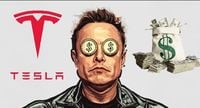Elon Musk, the ever-controversial CEO of Tesla and SpaceX, has once again found himself at the center of a storm—this time, not just for his headline-grabbing tweets or political stances, but for a wave of executive departures, investor revolts, and an ongoing debate about the future of Tesla itself. While the third quarter of 2025 brought a much-needed rebound in deliveries for the electric car maker, the company is grappling with internal unrest and mounting external scrutiny over its leadership and governance.
According to the Financial Times and reporting by BFM Business, Tesla is currently experiencing a significant “brain drain.” In recent months, several key executives have left the company, including Daniel Ho, who oversaw new vehicle development, and Vineet Mehta, a renowned battery specialist. This exodus has set off alarm bells within the industry and among Tesla’s own workforce. Employees, speaking anonymously to Financial Times, point to Elon Musk’s behavior and increasingly public political engagement as major factors undermining morale, retention, and recruitment. “The only constant in Elon’s universe is how quickly he burns through his deputies,” one adviser told the paper. Another employee lamented, “Elon’s behavior is hurting morale, retention, and recruitment.”
It’s not just the relentless work pace—long a hallmark of Tesla’s culture—that’s wearing people down. Staffers describe a recent deterioration in the work environment, much of it tied to Musk’s polarizing political activities. Giorgio Balestrieri, a former algorithmic engineer at Tesla, broke ranks with the normally tight-lipped culture to post his concerns publicly after resigning. “I believe Elon has seriously damaged Tesla’s mission (and the health of democratic institutions in several countries). It’s not just about politics: it’s about lying to the public, manipulating public debate, targeting minorities, and supporting climate change deniers and political forces close to the oil and gas industry,” Balestrieri wrote on LinkedIn.
Another source of frustration? Musk’s “obsession” with OpenAI and rivalry with Sam Altman, as reported by Financial Times. After co-founding OpenAI together, the two billionaires have become adversaries, with Musk launching his own AI venture, xAI (Grok). According to one departing executive, “Elon is angry about ChatGPT and spends every moment trying to put Sam out of business.” Musk’s push to make Grok’s algorithm “less woke” has also proved divisive, even within his own team.
Tesla itself has been reshaped by Musk’s shifting priorities. In April 2025, the company slashed 14,000 jobs—a move aimed at refocusing resources on artificial intelligence and robotics, rather than traditional car manufacturing. As a result, Tesla abandoned plans for a much-anticipated $25,000 affordable model, instead doubling down on the development of robotaxis. This decision drew criticism from analysts, who had seen the so-called “Model 2” as key to ramping up production and achieving the ambitious goal of 20 million Tesla deliveries by 2030. However, Tesla has promised to launch a more affordable version of the Model Y by the end of 2025, offering some hope to budget-conscious consumers.
While all this was unfolding behind closed doors, Tesla’s public image took a hit—at least according to some owners and industry observers. As one Tesla owner told BFM Business in June, “It’s a great product but the brand image has taken a big hit because of Elon Musk. Because of his antics, we’re going to suffer a bigger depreciation.” There’s a sense that Musk’s personal controversies—ranging from political statements to social media feuds—are starting to weigh on the resale value of Teslas, despite the vehicles’ technical prowess.
Yet, for all the turmoil, Tesla’s Q3 2025 results provided a glimmer of optimism. Deliveries rose by 7% year-on-year, handily beating Wall Street’s expectations and marking a reversal after three straight quarters of decline. Some analysts, though, urge caution in interpreting these numbers, noting that the end of the $7,500 federal tax credit for electric vehicles in the U.S. at the close of September may have artificially boosted sales as buyers rushed to beat the deadline.
Against this backdrop, Elon Musk’s personal fortune soared to new heights. On October 1, 2025, Forbes reported that Musk’s net worth had briefly topped $500 billion—a staggering figure that underscores both his influence and the volatility of his business empire.
But the good news for Musk didn’t last long. On October 2, 2025, a group of institutional investors—including major pension funds—publicly called for the rejection of a new Tesla CEO compensation package that could ultimately be worth up to one trillion dollars. This dramatic move came in the wake of a previous $55 billion pay package for Musk being struck down as illegal due to shareholder deception. Tesla’s board had attempted to replace it with a $26 billion offer, contingent on Musk remaining CEO for two more years.
Investors argue that the proposed performance targets are “vague” and “undemanding,” and that issuing new shares to Musk would dilute existing shareholders’ stakes. In a letter to Tesla shareholders, the investor group called for the replacement of all board members up for re-election, citing concerns about governance and the long-term value of the company. Their criticism centers on the board’s lack of independence—pointing to close personal and financial ties between Musk and key directors. Ira Ehrenpreis, for example, is described as a close friend of Musk; Kathleen Wilson-Thompson is a significant shareholder; and Joe Gebbia faces allegations of a conflict of interest.
The letter also urges shareholders to vote against proposals to issue new shares, arguing that such moves would undermine Tesla’s valuation and fail to hold Musk to rigorous, transparent standards. As the investor group put it, “The performance objectives tied to this compensation are ‘vague’ and ‘not demanding,’ and the new share grants would dilute value for existing shareholders.”
This shareholder revolt highlights a deeper question: Can Tesla continue to thrive under Musk’s singular leadership style, or does the company need a more independent board to safeguard its future? Critics say that without meaningful checks and balances, Tesla risks being steered by the whims of its mercurial CEO—potentially to the detriment of both employees and investors.
As Tesla heads into the final months of 2025, the company stands at a crossroads. Its technological achievements and recent delivery rebound are undeniable, but so too are the challenges posed by executive turnover, investor dissatisfaction, and a leadership culture that some say is more volatile than visionary. Whether Musk can steer Tesla through this turbulence—or whether the company will be forced to chart a new course—remains the billion-dollar question.




